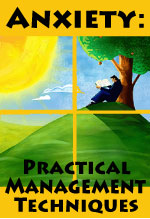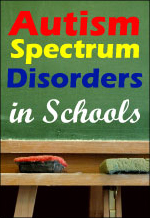
Click on image to view course webpage
Nearly every client who walks through a health professional’s door is experiencing some form of anxiety. Even if they are not seeking treatment for a specific anxiety disorder, they are likely experiencing anxiety as a side effect of other clinical issues. For this reason, a solid knowledge of anxiety management skills should be a basic component of every therapist’s repertoire. Clinicians who can teach practical anxiety management techniques have tools that can be used in nearly all clinical settings and client diagnoses. Anxiety management benefits the clinician as well, helping to maintain energy, focus, and inner peace both during and between sessions.
The purpose of this continuing education course is to offer a collection of ready-to-use anxiety management tools. 2007 | 41 pages | 30 posttest questions | Course #40-12

Customer Reviews:
- “I really liked the course. Very user friendly!” – Kris B. (Counselor)
- “Thank you for the opportunity to access interesting subject for ceu’s. Your online class information and techniques are practical and easy to apply to the every day therapy.” – Cheryl B. (Occupational Therapist)
- “Very concrete and helpful course that I can use personally and in my OT pediatric practice” – Anne E.(Occupational Therapist)
- “I really enjoyed this course. It was a great review of major concepts and provided excellent opportunities to improve and expand best practices.” – Kathleen F. (Social Worker)
CE Credit: 4 Hours (0.4 CEUs)
Target Audience: Psychology Counseling Social-Work Occupational-Therapy Marriage-and-Family
Learning Level: Intermediate
Online Course: $56
Learning Objectives:
- Describe two natural bodily functions that serve as powerful and basic tools for anxiety management
- Distinguish between the use of anxiety management techniques for prevention and intervention
- List and define nine basic categories of anxiety management techniques
- Identify at least one specific exercise in each of the nine basic categories of anxiety management techniques
- Name ten anxiety management techniques that employ cognitive restructuring as their base
- Describe two anxiety management techniques that address the specific disorders of phobia and panic attack
About the Author:
Lisa M. Schab, MSW, LCSW, is a Licensed Clinical Social Worker in private practice in Libertyville, Illinois. A graduate of Loyola University School of Social Work, Ms. Schab has specialized in anxiety and depression, blended families, and the treatment and prevention of eating problems and disorders. She has presented a number of professional training seminars and is the author of several books and continuing education courses, among them:
AOTA:
American Occupational Therapy Association (#3159)
APA:
American Psychological Association
ASWB: Association of Social Work Boards (#1046)
CDR: Commission on Dietetic Registration (#PR001)
NBCC:
National Board for Certified Counselors (#5590)
NAADAC: National Association of Alcohol & Drug Abuse Counselors (#00279)
California: Board of Behavioral Sciences (#PCE1625)
Florida: Boards of SW, MFT & MHC (#BAP346); Psychology &
School Psychology (#50-1635); Dietetics & Nutrition (#50-1635); Occupational Therapy Practice (#34). PDResources is CE Broker compliant.
Illinois: DPR for Social Work (#159-00531)
Ohio: Counselor, Social Worker & MFT Board (#RCST100501)
South Carolina: Board of Professional Counselors & MFTs (#193)
Texas: Board of Examiners of Marriage & Family Therapists (#114) & State Board of Social Worker Examiners (#5678)










Like this:
Like Loading...
 Course Abstract: Prescription drug abuse is on the rise. Pharmaceuticals like OxyContin®, Adderall®, and Xanax® are some of the most commonly abused prescription drugs. For some prescription drug addicts, medication was originally taken as prescribed – until they started developing a tolerance for it. For others, members of their peer group began to abuse prescription drugs because they are easily accessible and relatively inexpensive on the street. Prescription drug abuse also affects those who don’t use – through increased costs and the inconveniences of increased security at pharmacies. Treatment is comprised of a series of steps, including detoxification, inpatient/outpatient treatment, and maintenance. In some cases, patients must be closely monitored because of the potential for withdrawal effects. Once treatment is completed, there are various options for maintaining sobriety. Laws are being tightened, and some medications have become difficult to find due to the increased rate of prescription drug abuse. Course #30-61 | 2012 | 30 pages | 20 posttest questions
Course Abstract: Prescription drug abuse is on the rise. Pharmaceuticals like OxyContin®, Adderall®, and Xanax® are some of the most commonly abused prescription drugs. For some prescription drug addicts, medication was originally taken as prescribed – until they started developing a tolerance for it. For others, members of their peer group began to abuse prescription drugs because they are easily accessible and relatively inexpensive on the street. Prescription drug abuse also affects those who don’t use – through increased costs and the inconveniences of increased security at pharmacies. Treatment is comprised of a series of steps, including detoxification, inpatient/outpatient treatment, and maintenance. In some cases, patients must be closely monitored because of the potential for withdrawal effects. Once treatment is completed, there are various options for maintaining sobriety. Laws are being tightened, and some medications have become difficult to find due to the increased rate of prescription drug abuse. Course #30-61 | 2012 | 30 pages | 20 posttest questions

















 This course is offered for
This course is offered for 












